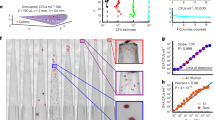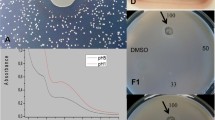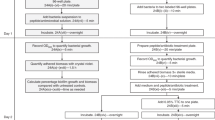Abstract
THE observation that commercial blue-black ink poured on to the uncolonized agar of a Petri dish culture of Trichophyton mentagrophytes became discoloured in the region of the dermatophyte, but not of a contaminating mould, led to further investigation of this phenomenon. A solution of one of the major constituents of blue-black ink—ink blue (supplied by Imperial Chemical Industries as ‘Ink Blue AS’ crystals)—behaved similarly, and it seemed probable that the clearing was caused by either pH or Eh conditions around the colony. The response of Ink Blue to changes of this kind was initially examined in aqueous solution.
This is a preview of subscription content, access via your institution
Access options
Subscribe to this journal
Receive 51 print issues and online access
$199.00 per year
only $3.90 per issue
Buy this article
- Purchase on Springer Link
- Instant access to full article PDF
Prices may be subject to local taxes which are calculated during checkout
Similar content being viewed by others
References
Mallinckrodt-Haupt, A. von, Abt. Bakt., 125, 368 (1932).
Cheaters, C. G. C., and Mathison, G. E., Sabouraudia, 2, 225 (1963).
Author information
Authors and Affiliations
Rights and permissions
About this article
Cite this article
BAXTER, M., COOPER, J. Ink Blue as a pH Indicator for Certain Biological Systems. Nature 204, 1105–1106 (1964). https://doi.org/10.1038/2041105a0
Published:
Issue Date:
DOI: https://doi.org/10.1038/2041105a0
This article is cited by
-
A new technique for isolating pathogenic fungi from mixed flora inocula
Mycopathologia et Mycologia Applicata (1972)
Comments
By submitting a comment you agree to abide by our Terms and Community Guidelines. If you find something abusive or that does not comply with our terms or guidelines please flag it as inappropriate.



